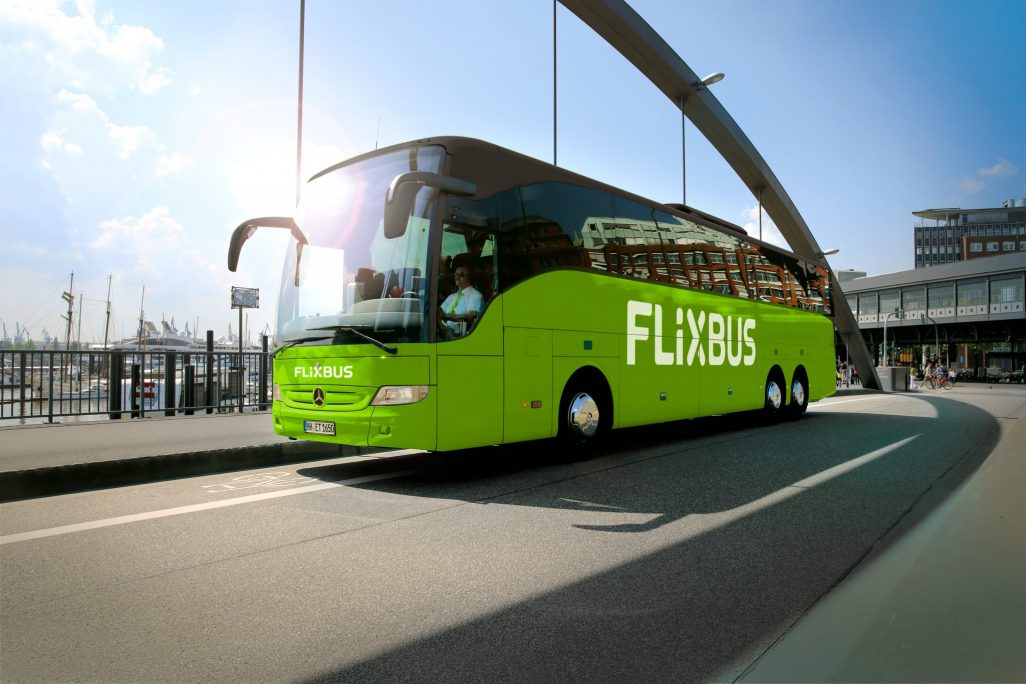Skift Take
A soft brand, FlixMobility is like an Oyo for bus and rail. That's why it had a $2.4 billion valuation going into the pandemic. A CEO interview suggests the startup's asset-light model could prove resilient.
Intercity buses and trains this week are pulling out of European stations once again. FlixMobility, a German company that has run FlixBus intercity buses since 2013 and FlixTrain rail service on select European routes since 2018, is revving its engines.
The Munich-based startup is resuming and launching intercity bus and rail service on Thursday and Friday in France, Italy, and Sweden as part of a phased reopening.
“The advantage bus and rail has on sustainability will fuel our growth as we bring up our networks again from the east coast of Turkey to the west coast of the U.S.,” said André Schwämmlein, a co-founder and co-CEO of FlixMobility along with Jochen Engert.
Before the pandemic, investors valued the startup at about $2.4 billion, according to Reuters when it raised a reported $561 million in a Series F round in 2019. Its backers included General Atlantic — whose previous travel investments included Airbnb, Priceline, and Uber.
The pandemic has postponed the startup’s plans for a stock market listing until 2022 at the earliest, sources said. In April, FlixMobility appointed Christian Rummel as chief financial officer. Rummel’s years in senior positions at Siemens in the capital market could give him the relevant experience to prepare for an initial public offering.
FlixMobility transported 62 million passengers in 2019, up from 45 million people the year before. But in 2020, the public health crisis disrupted cross-border travel, slashing the startup’s passenger volume in half.
“Obviously, we have been going through a tough time like the whole industry,” Schwämmlein said. “But we are well funded and able to take full advantage of the recovery as restrictions lift.”
As FlixMobility restarts in 36 countries, it is hiring for dozens of technical, marketing, and sales positions.
Its FlixTrain brand is expanding to its first new country. On Thursday, May 6, it opened its first line in Sweden, connecting Gothenburg and Stockholm. The Swedish company Hector Rail will operate the trains. Flixtrain will take over network planning, ticket sales, marketing, customer service, and pricing.
FlixTrain intends to resume service in Germany by June 24 on the Hamburg-Cologne, Berlin-Cologne, and Berlin-Stuttgart routes. The company is looking to grow its rail offering in Central Europe.
FlixBus, which has the largest cross-border bus route network in Europe, has been restarting services that it had suspended.
In Italy, FlixBus restarted service on Thursday, May 6. In France, it restarts service on May 7.
FlixBus entered the UK market last June. It plans to transport “several million” British passengers this year. It also moved into the Baltics.
The brand resumed limited service in Germany and Spain in March.
Controlling the Inventory
FlixMobility’s asset-light model puts it in partnership with other providers. Its model is like how Oyo offers branding and technology for a consistent experience in accommodation — only for ground transport instead.
FlixBus, for instance, works with more than 250 local bus operators. Operators typically receive as much as three-quarters of the ticket price. Contracts ensure the startup “owns’ the inventory.
The startup has a mobile app for booking, offers free Wi-Fi on the buses, and updates travelers about bus arrivals and departures by tracking the vehicles.
“Unlike a metasearch or online travel agency that just brings together inventory and sells it, we have to control our inventory,” Schwämmlein said. “Branding is part of it, but the key is collecting data to understand what our customers actually want and then providing consistent service tailored to those needs.”
FlixMobility’s goal is to become a generic transport brand that people turn to, switching between different modes depending on the journey.
“We need an integrated product for the same loyal consumer,” Schwämmlein said. “One day, you might travel from Munich to Hamburg and take rail, but another time you might go from Munich to Zurich by bus because it’s faster.”
Cracking the U.S. Market
The early recovery of domestic travel in the U.S. relative to Europe has renewed attention to FlixBus’s recent route expansion in California and other U.S. markets.
But does the Munich-based company understand how the U.S. bus market has different dynamics from Europe? Executives said they had eyed the market as a different beast. They studied the history of what has worked well and what didn’t as a blueprint.
Today FlixBus sees its main competitors as the plane and the car, rather than bus services like Greyhound or rail services like Amtrak,
“Take our L.A. to Vegas route,” Schwämmlein said. “We’re really competing with American Airlines there. That is kind of the battle we are in.”
FlixBus executives believe a few long-term trends, such as airline consolidation, an aging population, climate change, and a rising costliness for car ownership, will inflate the size of the U.S. intercity bus market. They also think that certain demographic segments, such as young people and seniors, want to avoid long drives if they can use the time to be online on their phone or tablet while sitting in a bus instead.
“We have a different philosophy than most of the past players,” Schwämmlein said. “Our ambition in the U.S. market is not to become the number-three player and then try to make some margin out of it. We want to reinvent a market with a better product that creates new demand and caters to actual booking behavior.”
FlixMobility hasn’t considered a rail offering in the U.S., but executives aren’t impressed by what they see. When commenting on the Biden Administration’s funding plan, Schwämmlein said he thought it would make more sense for the government to build the infrastructure and let operators compete in running services.
Direct Distribution Push

André Schwämmlein, co-founder and co-CEO of FlixMobility, which owns FlixBus and FlixTrain. Source: FlixMobility.
One critical driver to FlixMobility’s success has been getting consumers to book on its app rather than paying middlemen to get customers. The company claims a similar high direct booking rate as Airbnb, the short-term rental giant.
“Some politicians, in their speeches, complain about the distribution aspect, but that issue is overrated,” Schwämmlein said. “It’s pretty transparent to the consumer who the main service providers are. Getting third-party distribution is not our main challenge.”
FlixMobility does offer distribution through multi-modal travel search brand Omio and some other players, but it avoids others, like Kiwi.com. But the drive is direct business, and when it partners with third parties, it wants them to provide email or other contact information on the consumers who are booking.
“We have to own the customer,” Schwämmlein said. “We deliver the service, and there will never be someone between the customer and us. That’s essential because, otherwise, you become the inventory for someone who just compares your product to others.”
What about Google, which often looms large over travel marketing and distribution discussions?
“If Google comes to us tomorrow and says, guys, I want to distribute you, then we’ll give them the same contract like everyone else gets,” Schwämmlein said. “We can tell them we have the only inventory that is pan-European. Your metasearch for global customers is kind of useless without us. That stance gives us a fair chance in negotiation. We don’t want someone else taking all the value out of the business we are creating.”
Skeptics Are Skeptical
The big case against FlixMobility is that its ambitions will overreach.
When competing against state-backed players with inefficient business models, it was easy for the startup to provide a better level of quality service at a lower price. But can it sustain that high-margin pricing advantage for the long run when the market dynamics evolve?
Some skeptics have argued the company will be forced to raise prices to deliver the same product over time, like existing players have had to over time, as its busses and trains age and need repairs. When the buses get old, will the economics let its operators afford to buy new busses and maintain standards?
Skeptics argue that a lot of FlixMobility’s plans to sustain long-term growth depend on emergent demand to materialize as promised.
A third question is on the marketing challenge. Even if FlixBus or FlixRail can offer products on popular routes that are competitive in quality on time, can they create enough awareness for their products and compete with airlines and railways?
Historically in some markets, intercity bus travel is seen as déclassé by the middle class. Marketing has been a notorious challenge.
History of Acquisitions
FlixMobility’s founders came from outside the industry. Daniel Krauss is a former Microsoft employee, and André Schwämmlein and Jochen Engert worked for Boston Consulting Group. They founded the business technically in 2012 at the cusp of when German deregulations loosened up the transport market.
The company took an asset-light model from the start. It invests in technology, branding, customer data analysis, and market access. On the last point, acquiring players can often gain access to critical hubs. For example, in 2019 FlixMobility bought French bus service Eurolines from Transdev. That gave it vital access to hub stations in French cities that travelers already used.
Flixbus outmaneuvered a few bus companies and merged with rival MeinFernbus. In 2016, state-owned operator Deutsche Bahn shut down its competitor service. In 2016, FlixBus acquired rival Postbus and also acquired Megabus’ retail business in continental Europe from Stagecoach Group.
FlixBus now has about 80 percent share of the German intercity bus market.
While France had five major inter-city bus players back in 2015, it now has two: Flixbus and BlaBlaCar (which bought Ouibus and rebranded it BlaBlaBus).
Before the crisis, FlixMobility said it was profitable in its mature markets.
Coming out of the crisis, its fiercest rival in Europe may be BlaBlaCar, a Paris-based startup that offers both long-distance carpooling and intercity bus travel. In April, BlaBlaCar raised $115 million (€97 million) in new investment, and it said it had served 50 million passengers in carpools or buses in 2020. BlaBlaCar is reportedly interested in building a multimodal booking app and creating a private rail offering.
“We are the only real pan-European and global mobility platform that owns the inventory and develops the inventory,” Schwämmlein said. “That’s a big difference between us and everyone else, who are either local players, national like state rail, or very focused on a couple of markets, or they don’t own the inventory.”
An eventual IPO could give FlixMobility the capital to expand into promising markets in Latin America, India, and China. Schwämmlein wouldn’t be drawn into financial talk, but he agreed that the 10- to 15-year plan would be a worldwide brand with many products. The startup’s emerging FlixCharter brand aims to crack the charter market next, for instance.
“We still have a lot to do globally,” Schwämmlein said. “At the moment, our focus is the U.S., Europe, and Turkey. But we’ll look elsewhere in time.”
The Daily Newsletter
Our daily coverage of the global travel industry. Written by editors and analysts from across Skift’s brands.
Have a confidential tip for Skift? Get in touch
Tags: buses, flixbus, rail, rail travel, startups, startups europe, trains, travel startups, travel venture capital, venture capital
Photo credit: A Flixbus in Hamburg. FlixMobility


